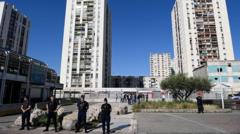On the 81st anniversary of D-Day, Defense Secretary Pete Hegseth’s tribute to Allied sacrifices plays out against a backdrop of contemporary geopolitical unease.
A Tense Commemoration: D-Day Reflects Modern Alliances

A Tense Commemoration: D-Day Reflects Modern Alliances
Defense Secretary Hegseth honors heroes while tension looms in Euro-American relations
June 6, 2025 – In a poignant visit to Normandy, France, Defense Secretary Pete Hegseth honored the fallen soldiers of D-Day at the Normandy American cemetery. This marked a significant moment as it was his first European trip since controversial remarks about America's allies circulated, stirring tension among old allies.
During a solemn ceremony, Hegseth addressed the assembled crowd, including a handful of aging American World War II veterans, by acknowledging the monumental effort of the Allies in breaking Nazi occupation during the 1944 operation. “The enemy underestimated the strength of the Allied war cause,” he stated emphatically, highlighting the critical contributions from American, French, British, and other forces in securing freedom in Europe.
His comments came as a relief amidst the backdrop of recent strained relationships between the United States and Europe, compounded by remarks about European nations being "PATHETIC." The atmosphere was charged with both remembrance of past sacrifices and apprehensions about current alliances.
Despite his respectful delivery, the unspoken tensions lingered like a shadow over the event. The memorial, rife with history and sacrifice, served as a reminder of both the unity forged through conflict and the challenges presented by contemporary diplomatic landscapes.
During a solemn ceremony, Hegseth addressed the assembled crowd, including a handful of aging American World War II veterans, by acknowledging the monumental effort of the Allies in breaking Nazi occupation during the 1944 operation. “The enemy underestimated the strength of the Allied war cause,” he stated emphatically, highlighting the critical contributions from American, French, British, and other forces in securing freedom in Europe.
His comments came as a relief amidst the backdrop of recent strained relationships between the United States and Europe, compounded by remarks about European nations being "PATHETIC." The atmosphere was charged with both remembrance of past sacrifices and apprehensions about current alliances.
Despite his respectful delivery, the unspoken tensions lingered like a shadow over the event. The memorial, rife with history and sacrifice, served as a reminder of both the unity forged through conflict and the challenges presented by contemporary diplomatic landscapes.



















